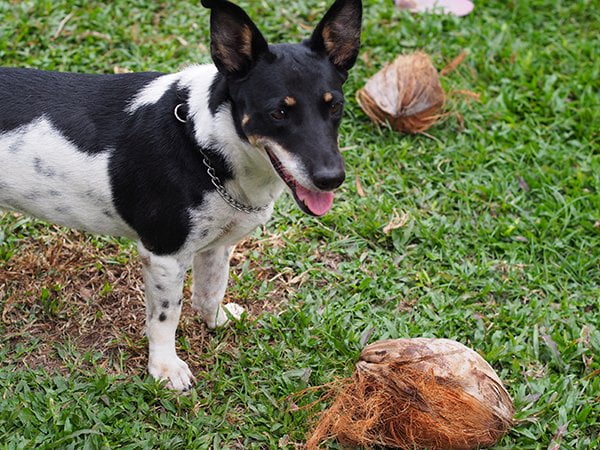Dogs seem to enjoy every bite of human food they can beg away from you. And since they are omnivores and can benefit from all sorts of foods, it's hard to know which human foods are safe to feed your dog and which can cause serious problems! For example - dog owners might wonder if coconut is safe for dogs to eat? Are there any benefits to a dog eating coconut?
Below, we'll tell you all about what coconut does for your dog, what you should avoid, and how to add coconut products to a balanced diet.
Can Dogs Eat Coconut?
Yes, dogs can eat coconut, as long as it's been properly prepared and you're not feeding them too much coconut! Coconut has many health benefits for dogs and humans alike. However, there are a few considerations you should keep in mind when deciding to feed your dog coconut.
If your dog eats coconut and has signs of upset stomach, diarrhea, or vomiting, stop serving it and contact your veterinarian.
Health Benefits Of Coconut
Vitamins and Minerals
This tropical fruit is a good source of many B vitamins (such as riboflavin, niacin, and others!). It also is rich in copper, calcium, iron, manganese, magnesium, and zinc. That's a lot of nutrients! These vitamins and minerals strengthen the immune system, promote strong bones and muscles, and improve brain function.
Antioxidants
Coconuts contain phenolic compounds and cytokinins. These antioxidants repair cell damage caused by free radicals and have anti-aging and anti-carcinogenic properties.
Lauric Acid
Lauric acids are medium-chain triglycerides that have anti-inflammatory properties! These fatty acids increase the good cholesterol levels in the blood and can help ward off viruses and diseases.
Skin Protecting Properties
The oil in coconut is an incredible emollient, it's deeply hydrating, and is great to use on dry, cracked paws.
The Downside Of Dogs Eating Coconut
High In Fat
The type of fat found in coconuts is healthy, but too many healthy fats can still cause issues. Too much fat in your dog's diet can lead to weight gain, upset stomach, and pancreatitis. Not only that, but coconut lacks the essential fatty acids that dogs need. There are many benefits to the fats found in coconut, but they are not the omega-3 and omega-6 fats that your dog requires.
Choking Hazard
While most of the coconut is safe for your dog to eat, the coconut shell absolutely is not. Many pet parents are tempted to give their furry friends a piece of the coconut husk to use as a chewing toy, but the hairy fibers are highly irritating to a dog's stomach. They also can get stuck in your dog's throat (leading to choking) or tangle up in the digestive tract (causing an intestinal blockage).

Source: Flickr
What Is The Best Way To Feed Your Dog Coconut?
It's absolutely fine to simply cut off a chunk of coconut flesh and feed it to your dog, but you likely don't keep whole coconuts lying around! Here are some ways to add coconut to your dog's diet.
Dog Treats - There are many recipes for homemade dog treats that include coconut! You can blend berries and coconut water together and freeze them in ice cube trays to make the perfect treat for a hot day! You can add shredded coconut or coconut oil to dog biscuits.
Shredded Coconut - Offering a small amount of shredded coconut flakes is an easy way to feed your dog coconut meat. Be sure to use unsweetened flakes, and look for flakes shredded as finely as possible. Large flakes may cause choking in small dogs.
Coconut Oil - One of the easiest methods of feeding your dog coconut is to drizzle a small amount of coconut oil over the top of a bowl of dog food. It can be beneficial for your dog's skin and coat.
Frequently Asked Questions
Can Dogs Eat Coconut Oil?
Yes, it is safe to feed your dog coconut oil. Adding coconut oil to your dog's diet can lead to a shiny, healthy coat. However, it's important to remember that coconut oil is, in fact, an oil.
Sometimes, we are tempted to consider solid coconut oil to be more of a food than an oil! Feeding coconut oil in too large amounts will overwhelm your dog's digestive system and lead to stomach upset and loose stools.
Can Dogs Drink Coconut Water?
Pure coconut water, with no additives, is a healthy and safe drink for your dog. However, it's important not to offer too much coconut water, as it's higher in potassium than other parts of the coconut. If a dog consumes too much potassium, it might have heart arrhythmia, numbness, and vomiting.
Can Dogs Drink Coconut Milk?
Yes, it is safe to feed your dog coconut milk as long as it is unsweetened! Sweetened coconut milk contains added sugars that serve no purpose in a dog's diet and can cause long-term health issues. Instead, opt for unsweetened coconut milk in small doses.
Can You Give Sweetened Coconut To A Dog?
Sweetened coconut is not recommended to be given to dogs and is best to be avoided. The added sugar used to coat these coconut flakes has no nutritional value, can lead to long-term health problems, and may irritate your dog's stomach.
Can Dogs Eat Coconut Sugar?
There is never any need for a dog to eat coconut sugar or coconut flour. However, some people use these ingredients when baking cookies as a healthier alternative to cane sugar and wheat flour. If your dog manages to sneak a bite of your dessert, rest assured that coconut sugar is not toxic to your canine companions.
